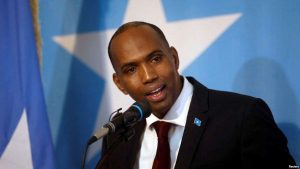There were fears that the massive outrage and the government’s initial reluctance to respond would risk plunging Somalia into a new political chaos.
By Judy Maina, judy.maina@alleastafrica.com
NAIROBI – The social media networks uproar over the extradition of a rebel leader to Ethiopia remains a worrying subject for the government which was pushed to the corner for days. But the defiant Somali government dismisses the outrage and came out to clarify: He was a threat to the country’s security.
Abdikarim Sheikh Muse, aka Qalbi Dhagah, an executive leader of the Somali-ethnic rebel group fighting Ethiopian government has been extradited to Ethiopia last week, sparking a massive outrage across Somalia and beyond.
Founded in 1984, ONLF is fighting for independence from Ethiopia, complaining of discrimination by the central government against the region’s Somali-speaking nomads.
There were fears that the massive outrage and the government’s initial reluctance to respond would risk plunging Somalia into a new political chaos.
For some, it’s a historical slip-up by the government. For others, it’s parts of the implementation of a security pact between Somalia and Ethiopia. The news about the man’s extradition has been widely circulated on the social media and has attracted hundreds of thousands of Somalis.
BREAKING SILENCE

Despite facing a wave of unprecedented fury, Somali government led by prime minister Hassan Khaire has stepped gingerly into the fray, a political strategy which at one point tried to ease tension surrounding the matter and again clarified its standing towards the rebel leader’s extradition.
In a statement by the cabinet on Tuesday, the government has however skirted to concur Ethiopia’s reference to ONLF as a ‘terrorist’ organization.
According to the government, an agreement signed by the previous government of the former Somali president Hassan Sheik Mohamud with Ethiopia last year has paved way for the extradition of people seen by both countries as criminals between the two countries.
Notwithstanding the fuzz, many believe that clarifications by the government has helped alleviate the mounting pressure which analysts said threatened the very existence of the government which is struggling to rebuild the long-troubled nation which is recovering from decades of war.
“At one point, the prime minister’s bold decision to step in and clarify the government’s stand towards the extradition helped ease the tension.” said Jacob Moses, a Nairobi-based horn of Africa analyst.
With that political game, the government has gathered additional chips with regards to its survival in the face of the significant social media battle and protests against it.” he said.
In the meantime, the decision by the Somali prime minister Hassan Khaire, famous for his humble lifestyle and regular interactions with average citizens to respond to the crisis had earned him a praise by the country’s leaders and the public.
Some of the country’s 329-member parliament hailed the government’s move, stressing that the current president has acted in accordance with a security pact reached by the two neighboring states.
“Khaire’s administration is responsible of the country’s security.” said Dahir Amin, a Somali lawmaker.
PUBLIC IMAGE
In decades, Somalia has been a country that that has had difficulty in ensuring public officials are held accountable for corruption, and in which there have been low levels of public involvement in the political process.
However, early efforts for the country to embrace good governance scored early success, thanks to Mr. Khaire’s strategic efforts in making the government more accountable to the public, an attempt seen by many as an effective method of re-engaging citizens with the political process after decades of macro-economic instability and rampant corruption.
Khaire has subsequently warned officials of ‘zero tolerance’ for corruption which he termed an ‘evil’ holding his country back.
Somalia’s finance minister Abdirahman Baileh has since reported steady progress in fighting corruption and economic growth for the horn of Africa following decades of conflict which shuttered the country’s economic infrastructure.
According to observers, his government’s military strategic fight against Al-Shabab has had a significant impact on the battlefields, having seen troops secured new areas.
Appointed six months ago, Mr. Khaire’s administration has also ensured to pay and even feed its soldiers on regular basis, something that might have boosted soldiers’ morale unlike his predeccessors who rarely paid the army.
NEW EVOLUTION
According to Transparency International, a global corruption watchdog, Somalia has made improvements several areas such as economic improvements and securitt in recent years, thanks to the new government which has made the combat against corruption and political stability key priorities.
Corruption has long been one of the biggest obstacles to growth in Somalia. Despite old corruption practice, no officials have ever been charged with corruption, something that continue to frustrate citizens living in the country.
(Additional reporting by Alleastafrica reporter in Mogadishu, editing by Jeff Mwaura)
Copyright ©2017 Alleastafrica.com All rights reserved. The information contained in Alleastafrica.com may not be published, broadcast, rewritten, or redistributed without the prior written authority of Alleastafrica.com



